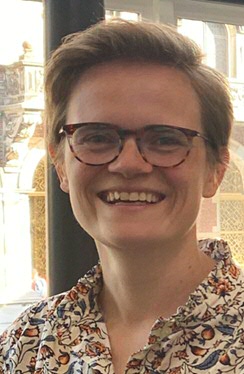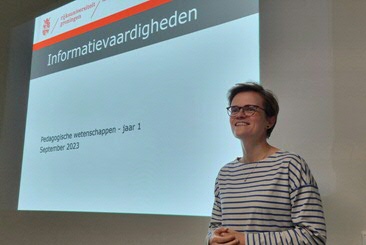Meet Lilian Tabois, Information Literacy Specialist

Information literacy training is an important ingredient in helping to build the critical thinking skills that students will need in their future careers. Meet Lilian Tabois and find out how the University of Groningen Library (UB) supports students and researchers in developing their information literacy skills.
“In an increasingly globalized and digital academic landscape, it is essential that students and researchers know where and how to find credible sources, how to assess these sources critically, and how to incorporate them into their academic work.”
You are an information (literacy) specialist in the UB’s education support team. Can you briefly explain what information literacy is and why it is important for students and researchers?
Information literacy is the ability to identify, find, evaluate, and process information and to use this information responsibly. In an increasingly globalized and digital academic landscape, it is essential that students and researchers know where and how to find credible sources, how to assess these sources critically, and how to incorporate them into their academic work following the principles of academic integrity. Information literacy training is an important ingredient in helping to build the critical thinking skills that the current generation of students will need in their future careers. It is also a key building block for lifelong learning.
What are the key ways in which you support students and researchers?
We offer information literacy training to students and researchers across faculties. Our sessions cater to every level and different stages of academic training, from Bachelor’s students to senior researchers. One of our core activities is the library lecture. We teach students how and where to find literature on their own and how to evaluate the reliability of scientific information. Our lectures are often embedded in the curriculum, and we aim to align our activities with the writing assignments that the students have to complete for their core modules. In this way, they can immediately start applying their new-found abilities. For first-year students especially, searching for academic sources can be quite a daunting task, so we try to guide them through this process step by step. It is really gratifying to see a student gain confidence in navigating databases and developing search strings that allow them to get high-quality and relevant search results for their research projects.

We also offer one-on-one consultations for PhD students and other researchers on how to develop a systematic literature review. This type of consultation is suitable to provide custom advice and in-depth assistance on research strategies that are needed for more advanced literature research.
We are continuously innovating our teaching practices, making use of active teaching methods to make the sessions more interactive. Moreover, we are currently developing an e-learning module and a series of knowledge clips on information literacy topics, and we are creating an online manual on how to conduct a systematic literature review.
How do you stay up to date in the constantly changing digital learning environment?
Fortunately, there are many opportunities for us to stay abreast of the latest developments in our field. For example, we regularly participate in knowledge exchange sessions with other Dutch university libraries. We recently joined a national seminar on best practices in information literacy training for law students. It was really stimulating to exchange knowledge and ideas and to see how other universities organize their information literacy training programmes. We also regularly attend conferences, workshops, and study days and read up on the latest literature on the topic.
One major development that we are currently keeping a close eye on is the rapidly evolving field of AI. Generative AI tools such as ChatGPT have the potential to significantly alter the ways in which we access, process, and critically evaluate information. For example, ChatGPT can generate inaccurate or even fake references. Making students aware of this may help them to navigate a world in which it is becoming increasingly difficult to assess the credibility of a source of information.
Are there any online resources that students or researchers can access to enhance their information literacy skills?
Our Library Guide Information Literacy offers an excellent departure point if you are keen to enhance your information literacy skills. The subject-specific Library Guides contain a useful overview of relevant resources and bibliographic databases for that particularly field of research. Other university libraries also often offer library guides on a wide range of topics, many of which are freely accessible online. Moreover, major bibliographic databases such as APA PsycINFO, Web of Science and Scopus offer free tutorials and other training resources on how to search for academic articles in an effective and structured manner.
Do you have any questions about information literacy (training)? Please do not hesitate to ask our experts at eduteam-library rug.nl.
More information:
| Last modified: | 10 January 2024 10.43 a.m. |
More news
-
13 May 2024
Trapping molecules
In his laboratory, physicist Steven Hoekstra is building an experimental set-up made of two parts: one that produces barium fluoride molecules, and a second part that traps the molecules and brings them to an almost complete standstill so they can...
-
29 April 2024
Tactile sensors
Every two weeks, UG Makers puts the spotlight on a researcher who has created something tangible, ranging from homemade measuring equipment for academic research to small or larger products that can change our daily lives. That is how UG...
-
16 April 2024
UG signs Barcelona Declaration on Open Research Information
In a significant stride toward advancing responsible research assessment and open science, the University of Groningen has officially signed the Barcelona Declaration on Open Research Information.

